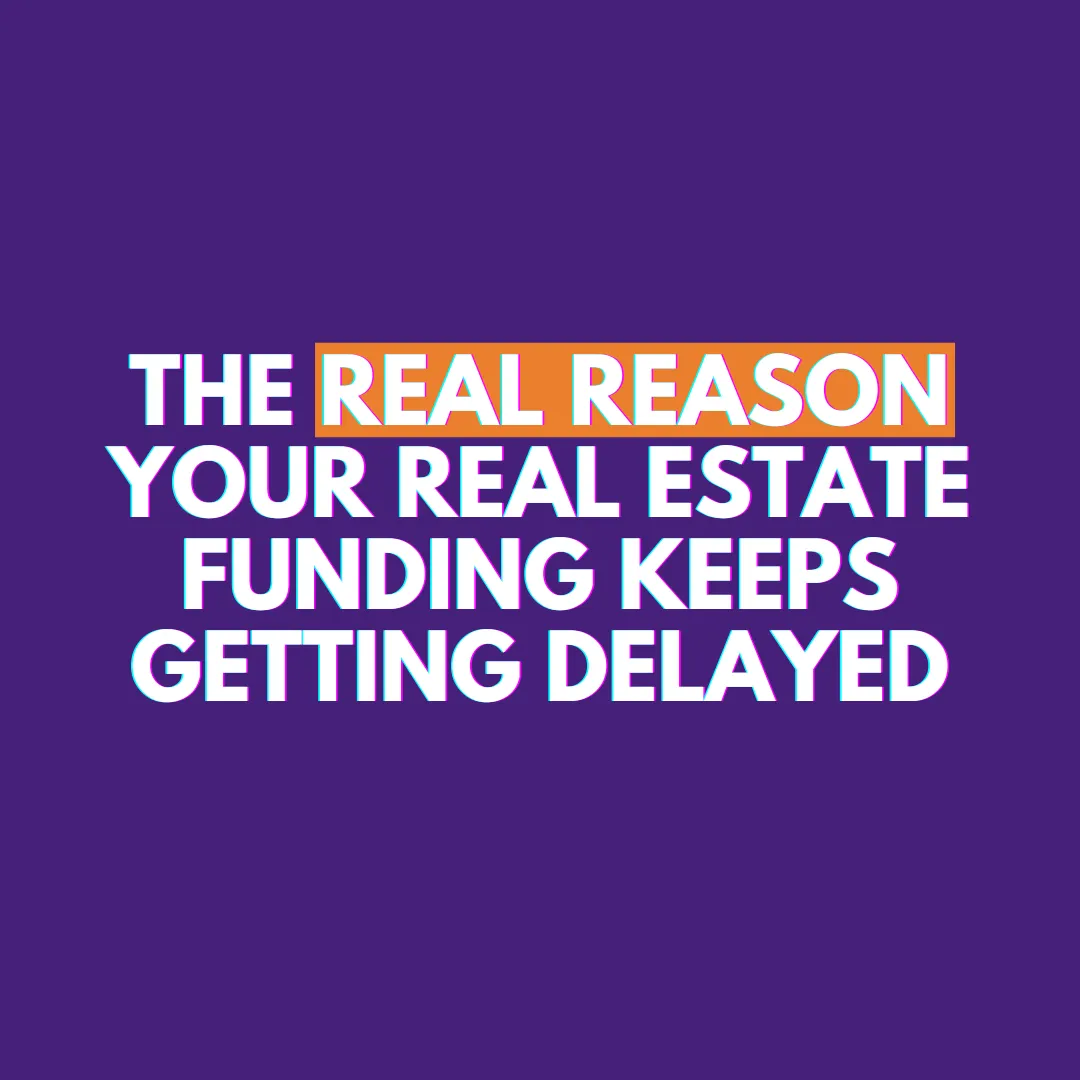

Blogs For My Verified Investor

The Real Reason Your Real Estate Funding Keeps Getting Delayed
The Real Reason Your Real Estate Funding Keeps Getting Delayed
You found the deal. You pitched a lender. You expected funding in a few days—but now it’s been a week, maybe two, and the money still hasn’t landed.
You’re frustrated. You’re blaming the lender. But here’s the truth:
Most real estate funding delays don’t come from the lender.
They come from you—your prep, your pitch, your process.
This post breaks down the real reasons private loan approvals get delayed (and how to fix them). If you want faster closes, smoother funding, and better lender relationships, start here.
What Private Lenders Really Look For in a Real Estate Deal
1. Your Deal Package Isn’t “Lender-Ready” (Yet)
The delay trigger:
You send a deal with vague numbers, no comps, no timeline, and ask, “Can you fund this?”
Why it slows things down:
Lenders aren’t here to build your pitch—they’re here to evaluate it. If they have to ask you for basic info, you’re already losing time.
Fix it fast:
✅ Create a clean, skimmable one-pager that includes:
Property address
Purchase price, rehab budget, ARV
Total loan request
Exit strategy
Deal timeline
✅ Attach photos, comps, and a short scope of work
✅ Show you know your numbers inside and out
Pro tip: Label everything clearly. PDF > Google Drive links > messy emails.
2. You’re Slow to Respond During Underwriting
The delay trigger:
The lender requests docs or answers and you reply... two days later.
Why it slows things down:
Every unanswered email hits pause on the process. Underwriters are working multiple files—and yours goes to the bottom of the pile when you lag.
Fix it fast:
✅ Check your inbox daily and respond within 12–24 hours
✅ Pre-load docs you know they’ll ask for:
Purchase contract
Scope of work
Contractor bid
Budget spreadsheet
Your ID + LLC docs (if needed)
Pro tip: Create a “funding folder” with all your recurring docs—so you never start from scratch.
3. You Keep Changing the Deal Mid-Process
The delay trigger:
You update the ARV, change the loan amount, swap contractors, or change your exit strategy—after the file’s already moving.
Why it slows things down:
Every change re-triggers underwriting. Even small updates need to be re-evaluated for risk, ratios, and timelines.
Fix it fast:
✅ Lock in your numbers before you pitch
✅ Only adjust when absolutely necessary—and flag changes early
✅ Keep your lender updated with clean, consolidated info
Pro tip: Don’t send 4 emails with piece-by-piece updates. Send one “Here’s everything updated” package.
4. You Haven’t Built Enough Trust Yet
The delay trigger:
You’re new, unknown, and haven’t proven yourself—so your file gets more scrutiny.
Why it slows things down:
Lenders move faster with repeat borrowers or well-prepared new ones. If you show up vague, hesitant, or underprepared, you look risky.
Fix it fast:
✅ Be upfront about your experience level—but back it up with a plan
✅ Present your team (GC, agent, mentor) if you’re new
✅ Be proactive, responsive, and organized—even if it’s your first deal
Pro tip: Confidence and prep often outweigh experience. Show you're sharp.
5. You’re Missing Key Documents (and Don’t Know It)
The delay trigger:
Lenders ask for docs... you scramble to pull them... one by one... over days.
Why it slows things down:
Lenders can’t move without key paperwork. If you’re not ready, they won’t wait forever.
Fix it fast:
✅ Prep a “funding checklist” before you ever send your first email
Essentials to have ready:
Signed purchase agreement
Detailed rehab scope
Comps or broker price opinion
Contractor license & insurance (if needed)
Estimated closing timeline
Entity docs (for LLC)
ID & contact info
Pro tip: Treat funding like a job interview—show up overprepared.
6. You’re Pitching Too Late in the Process
The delay trigger:
You wait until you’re under contract with a tight close date—then try to rush funding.
Why it slows things down:
Lenders need time. Even the fast ones. If you pitch with less than 5-7 business days to close, you’re already behind.
Fix it fast:
✅ Start sourcing capital the moment you have a deal under review
✅ Send initial deal breakdowns while your offer is in negotiation
✅ Build lender relationships before you’re under deadline pressure
Pro tip: Have a shortlist of 2–3 lenders you can pitch every deal to instantly.
Conclusion
Getting funding isn’t just about having a good deal—it’s about having a system.
The real reason your loan keeps getting delayed?
You’re sending lenders unfinished, unclear, or late-stage deals.
Fix that, and you’ll:
✅ Get faster yeses
✅ Build better lender relationships
✅ Close deals with confidence
At My Verified Investor, we help investors connect with funding-ready private lenders—but we also help you get deal-ready for funding.
Want to eliminate delays and start closing smoother? Sign up today and get lender connections + clarity on how to pitch smarter.

EXISTING BORROWERS:
Do you have an existing loan with HIS Capital and need to submit a Draw Request? Click the button below to submit a Draw Request now.
Privacy Policy | Terms And Conditions
2024 Copyright - Verified Investor| A division of: HIS CAPITAL GROUP HOLDINGS, LLC
Disclaimer: A verified investor, as described here, is a real estate investor actively involved in purchasing real estate assets, including but not limited to mortgages or properties. It's important to note that a verified investor is distinct from an accredited investor, who meets specific criteria such as income, net worth, or professional experience, as defined by securities laws and regulations. The term 'verified investor' pertains specifically to real estate investing and should not be confused with the accreditation status required for certain investment opportunities.
Verified Investor is not a law firm or a registered investment advisor, and it does not provide legal or investment advice
Facebook
Instagram
X
LinkedIn